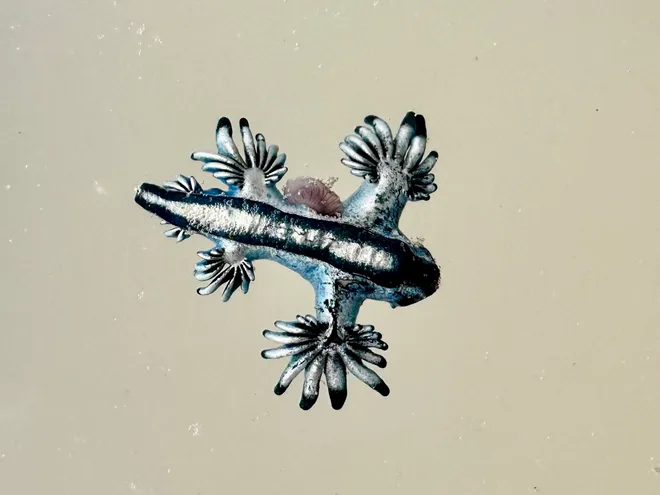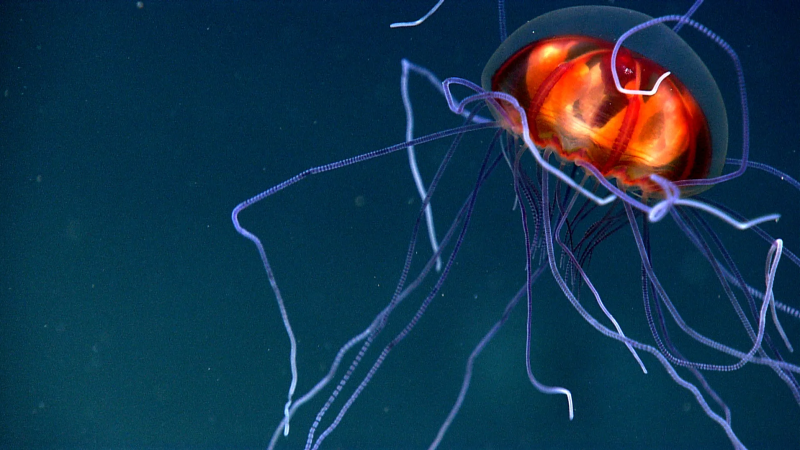Blue dragons in Texas? Creatures wash up on Texas beaches, officials warn not to touch

Creatures called blue dragons are washing onto the shores of Texas beaches. Officials are warning spring breakers, and other beachgoers, to stay away from them. Some folks say they resemble a Pokémon character.
While the toxic sea animals usually live in the open ocean, according to One Earth, the Harte Research Institute for the Gulf of Mexico posted on Facebook stating what the organism preys on:
Touching one will ruin any beach day, and anyone visiting Texas' beaches should beware and avoid touching the tiny but powerfully toxic sea creatures.
What else to avoid this spring break?Avoid sargassum seaweed, algal blooms on Florida beaches in spring with water quality maps
What is a blue dragon?
The tiny slug is a blue glaucus, but it's also known as a sea swallow, blue angel and, of course, blue dragon.
They're bright blue and white with appendages that look like wings going down its side and, according to Oceania, can grow up to 1.2 inches.
"It's a real pretty iridescent blue and silver, "Jace Tunnell, a marine biologist at Texas A&M University-Corpus Christi. "That's why people want to touch them."
Despite its stunning look, the institute posted a warning on Facebook recommending beachgoers "only take photos" and avoid touching them.
According to Tunnell, the dragons live on top of the water and float upside down. He says the blue side makes them look like water to a bird, while the silver bottom side looks like the sky to any fish that may be craving a snack.
They can be found in the Atlantic, Pacific and Indian Oceans, according to Oceania.
How do blue dragons sting people?
The animal is immune to the toxins produced by its prey and collects it in special sacs found in the branches at the end of its appendages.
"These things eat man-o-war tentacles, and they can actually take out the stinging cells, called nematocysts, and store them in those feather appendages," said Tunnell. "And then they release them when they're agitated, which is why we tell people not to touch them."
What happens if you get stung by a blue dragon?
According to One Earth, one sting can lead to the following:
- Nausea
- Pain
- Vomiting
- Acute allergic contact dermatitis
- Post-inflammatory hyperpigmentation
Tunnell told USA TODAY that while rare, people can still be sent to the hospital because they had a bad reaction to the dragon's venom.
"Everybody is gonna react differently to the sting," said Tunnell. "Some people have a bad reaction to it."
He said people can struggle to breathe, get nauseous and vomit and suggests those suffering from more serious reactions get medical attention immediately.
Julian Obayd is a marine biology student from Australia who was left with dozens of sting marks from a blue dragon, reports Inside Edition.
"It is the most painful thing you can imagine," she told the media outlet.
Expert offers advice on what to do (and not to do) if you are stung by a blue dragon
Since the dragons like to chow down on man-o-wars and store their venom for later, the same methods one would use to treat a man-o-war sting can be used for blue dragon stings.
Tunnell says pouring hot water and vinegar will help deactivate the toxins. Without that, he says the pain can last for one to three hours.
Folks will still feel some pain after pouring vinegar and hot water, but it won't be as intense. Pain pills, however, will become a blue dragon's victim's best friend for the day.
- Don't pee on the sting: It won't do anything. You'll just be in the same amount of pain.
- Don't put it back in the ocean
- Don't rub sand on it: This will only make the pain worse because, according to Tunnell, it will agitate the stinging cells and reactivate them.

Julia is a trending reporter for USA TODAY. She has covered various topics, from local businesses and government in her hometown, Miami, to tech and pop culture. You can follow her on X, formerly known as Twitter, Instagram and TikTok: @juliamariegz.
Disclaimer: The copyright of this article belongs to the original author. Reposting this article is solely for the purpose of information dissemination and does not constitute any investment advice. If there is any infringement, please contact us immediately. We will make corrections or deletions as necessary. Thank you.







